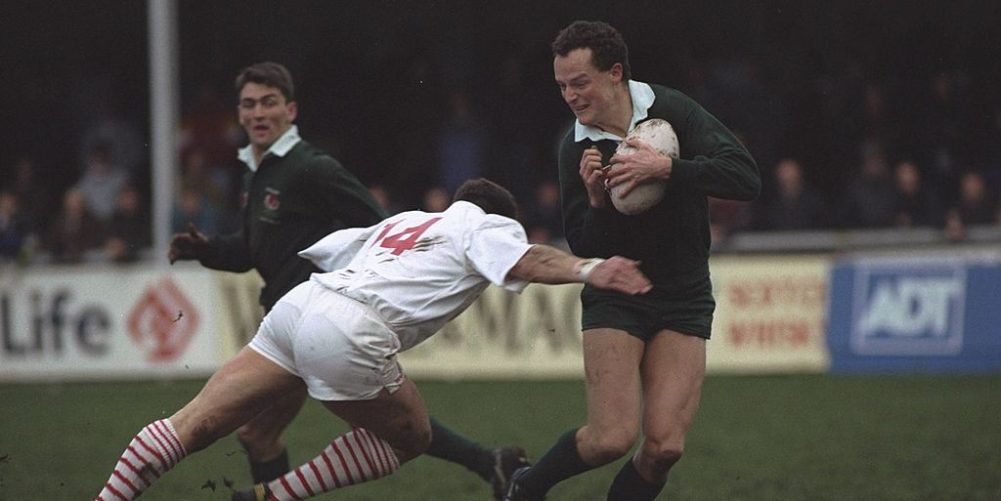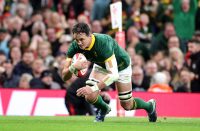In their final rage at the dying of the amateur light, the RFU did something which provoked angry questions in both Houses of Parliament. They banned Steve Pilgrim for life. Far from getting even remotely close to fitting the crime, the punishment appears more outrageous with the passing of almost every week.
A domestic professional game wracked by all manner of rows over all manner of issues from broken contracts to salary cap skullduggery makes Pilgrim’s treatment all the harder to understand.
He has long considered himself a victim of injustice, with good reason. Early in 1993, the Wasps full-back had a trial for Leeds Rhinos’ Seconds against Wakefield Trinity Reserves under a thin cloak of anonymity, perhaps not the smartest move given his rising profile as part of England’s extended squad for the World Cup two years later.
As soon as the AN Other had been unmasked, the RFU reached for their black cap and declared Pilgrim persona non grata in Rugby Union for the rest of his days. “I played the game on the Tuesday night,” he says. “On the Wednesday I found out from the Press that they’d banned me for life.”
The summary nature of his ex-communication, without being offered the chance to say a word in mitigation, left one of England’s brightest uncapped players sorely tempted to put as much distance between himself and Twickenham.
Indeed, Pilgrim (pictured above tackling Jonathan Webb) can be found about as far from HQ as the planet allows, at a place called Red Beach on the Whangaparoa Peninsula north of Auckland. He relocated there not for any loathing of the RFU but for the love of a New Zealand woman, Sheree, now his wife and mother of his two teenaged daughters.
He has ‘moved on’ psychologically as well as physically but only up to a point. More than a quarter of a century after the RFU sledgehammer demolished his hopes of playing for England, Pilgrim reveals an enduring ‘hurt’ over his treatment.
At a time when the RFU ought to have been preparing for the imminent advent of professionalism, the reactionaries running the game enforced a law made in the late 19th century demanding instant banishment for any amateur playing Rugby League.
“No person shall play in a trial or play with a non-amateur club or a non-amateur organisation involved in the playing of any type of rugby football.”
Pilgrim’s claim that he received diddly squat for the try and three goals he scored that night counted for nothing. Two England full-backs from the previous generation, Dusty Hare and Alastair Hignell, had been free to resume their rugby careers despite spending their summers engaged as professional county cricketers.
“If I’d played for Manchester United and been paid a million pounds for scoring the winning goal, I could have turned out for Wasps the following week with my amateur status intact,” Pilgrim says. “That exposes the hypocrisy of a law made over 100 years ago. I didn’t get a penny from Leeds. I got my hotel paid for but I probably received more money as an amateur Rugby Union player in petrol expenses than I did from Rugby League.
“I have heard, that at least one member of the RFU committee who banned me had played Union and League. Nobody will ever realise how much the RFU hurt me, and my family.
“It leaves a pretty big scar. There were serious family issues which must remain private but I’m very proud of the fact that my mum (Lesley) still devotes a lot of her time to the grassroots game as vice president of Yatton RFC.”
Pilgrim’s only ‘crime’ was to be caught, unfortunately so given that one of the few reporters covering the match recognised the A N Other. “The reporter didn’t make himself known to me but he was only doing his job and you can’t fault anyone for that. I had put myself out there.”
Once the cat had been sprung from the bag, the RFU had to act but they ought to have judged the case in the light of flagrant flouting of the amateur regulations by Union players on a weekly basis, especially in France and South Africa.
A six-month ban would have been sufficient. The furore reached the Commons and the Lords before the RFU came to their senses and reinstated Pilgrim the following year, ironically enough at roundabout the time when they stripped Will Carling of the England captaincy for referring to the 57-strong RFU committee as the ‘old farts’.
The last Union player to be hammered for a dalliance with League, Pilgrim believes he became a victim of politics, the final casualty of one Union’s desperate attempt to defend an amateur ethos rapidly descending into the indefensible.
Within a year, Union had been declared an open game. In next to no time their clubs rushed to sign many of those supposedly devilish League players, not least Scott Quinnell for whom Richmond outbid Wigan to bring the Welshman back before the London club flew too close to the sun and disappeared like Icarus.
“There were a lot of murmurings at the time about the game going professional,” Pilgrim says. “As players, you had to be professional in attitude which meant more and more time in the gym but you couldn’t be paid. I was the flag they needed to pin against their mast to show amateur was alive and well.
“A lawyer wrote to me saying I should take it to the European Court of Human Rights. That would have meant standing in court and dobbing on 300 or so players who had been paid bigger expenses cheques than they could justify and given free cars, free boots, free everything.
“That would have led to the unravelling of just about every major rugby club in the country as well as the RFU. I didn’t want to sleight the game I loved and so I decided to take the life ban.
“I’ve been called a moron and accused of stupidity but I like to be able to sleep at night. And I still have many friends in England even though I haven’t lived there for 20 years.
“I still love the game. The fact that I didn’t do well out of it doesn’t matter any more. We all move on but it still hurts for a lot of reasons, mostly because they denied me the chance to achieve higher honours and finish playing on my terms. I don’t know how good I could have been.
“It was clear from being in England’s extended World Cup squad that I was in the top three or four full-backs. Jonathan Webb was retiring which meant I was up there with Mike Catt, my Wasps team-mate Alan Buzza and Tim Smith at Gloucester.”
The ground lost through the ban effectively dealt him out of the equation. Pilgrim, then approaching his prime at 26, is 52 now, living on the shores of the Pacific and running his own landscape gardening business, ‘Get It Done’.
He appreciates better than most how professional has changed rugby’s landscape. During an ill-fated England series in New Zealand some years back, Pilgrim turned up at training with nothing more sinister on his mind than to renew some old acquaintances.
“I’d only been there a few minutes when the management sent one of their people out to question me. He wanted to know whether I had a link to the All Blacks and if I was spying on England. How sad was that…?”























